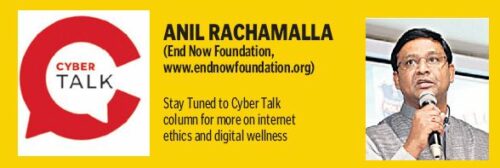Cyber Talk: Don’t get cheated by online fraudsters

Always be wary of unsolicited emails or calls, and never provide personal or financial info to an unknown party

Online financial fraud can take many forms, including phishing, cyber extortion, fake investment schemes and payment fraud. These types of scams typically involve tricking individuals into revealing their personal and financial information or conning them into making payments to fake entities.
One needs to thoroughly research and verify any offers before providing personal information or making payments. Always be wary of unsolicited emails or calls, and never provide personal or financial information to an unknown party.
Additionally, never make payments upfront for a loan, job opportunity, or prize, and be wary of any offers that seem too good to be true.
Few types of frauds:
Online financial social engineering frauds often use psychological manipulation tactics to trick individuals into revealing sensitive information or making fraudulent transactions. The common modus operandi used in these types of scams are social engineering tactics that include Phishing, Vishing and Smishing.
* Impersonation Frauds: In these scams, the fraudster pretends to be a trustworthy person, such as a government official or a tech support representative, and convinces the victim to reveal personal information or to make a payment.
* Fake Investment Scheme: In these scams, the fraudster promises high returns on investment and asks the victim to make a payment. Once the payment is made, the fraudster disappears and the victim never sees the promised returns.
* Payment Fraud: This type of scam involves tricking the victim into making a payment to a fake entity, such as a fake escrow service, in a transaction that appears legitimate but is actually fraudulent.
* Advance fee: Requesting part payment of an upfront fee in exchange for a larger reward or a loan that is never received
* Lottery: Notifying someone that they have won a prize in a lottery but requiring payment of a fee (either a difference amount or tax, etc.) to claim the prize, which is never received.
* Employment: Offering fake job opportunities and collecting personal information or money from job seekers.
* Fake NGO: Setting up fake charities to collect donations for personal gain.
* Pump-and-dump scheme: Illegally manipulating the price of a stock by spreading false or misleading information about the stock
* Work-from-home: Involve promising a job from home and requiring payment for training or deposits, but the job never materialises. Most of these tasks have penalty clauses for improper delivery which later use for extracting money from victims
* Overpayment Frauds: Sending a fake cheque for more than the amount due and then requesting that the victim return the overpayment in advance of the dispatch of the cheque.
* Fake loan: Offering loans with unrealistic terms and approvals in a few seconds, and then later extort money using social engineering tactics
* Online gaming: Scammers will try to trick you into believing that you initially won money, and later, as you invest more money, you will not be able to withdraw.
* Rental: Listing fake rental properties and collecting fee from individuals who believe they are renting the property.
How to be safe
Here are some guidelines that will help you minimise the risk of becoming a victim and protect your personal and financial information from theft.
* Verify the authenticity of websites before entering personal information
* Use strong, unique passwords having special characters, numeric and capital letters
* Monitor financial bank statements regularly
* Don’t click on short links or download attachments from unknown sources
* Research and verify offers before making payments
* Don’t provide personal or financial information to unknown people
* Be cautious of offers that require upfront payments
* Never save Card number and CVV number on websites
* Never do remote screen sharing of your mobile or laptop with unknown people
* Use two-factor authentication for all emails and social media accounts
* Never trust financial advice from social media influencers
* Report any suspicious activity to the authorities
Conclusion:
It’s very important that you dial toll free number 1930 immediately so that it helps you get back the lost money. 1930 is operated by Citizen Financial Cyber Fraud Reporting and Management System, Government of India. Alternatively, you can report the fraud at your local Cyber Crime Police authorities or register a complaint at https://www.cybercrime.gov.in.








